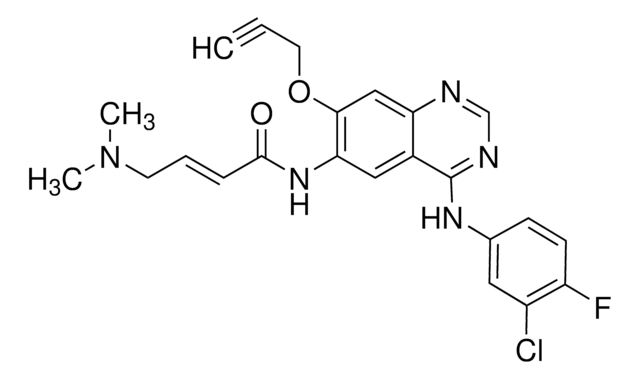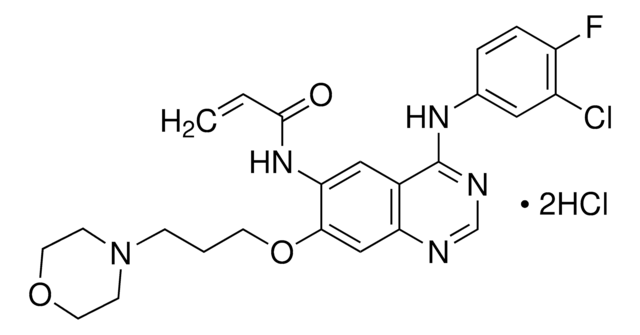PZ0330
Dacomitinib
≥98% (HPLC)
Synonyme(s) :
(2E)-N-[4-[(3-chloro-4-fluorophenyl)amino]-7-methoxy-6-quinazolinyl]-4-(1-piperidinyl)-2-butenamide, PF-00299804, PF-00299804-03, PF-299
About This Item
Produits recommandés
Niveau de qualité
Essai
≥98% (HPLC)
Forme
powder
Couleur
white to beige
Solubilité
DMSO: 2 mg/mL, clear
Température de stockage
room temp
Chaîne SMILES
Fc1c(cc(cc1)Nc2ncnc3c2cc(c(c3)OC)NC(=O)\C=C\CN4CCCCC4)Cl
InChI
1S/C24H25ClFN5O2/c1-33-22-14-20-17(24(28-15-27-20)29-16-7-8-19(26)18(25)12-16)13-21(22)30-23(32)6-5-11-31-9-3-2-4-10-31/h5-8,12-15H,2-4,9-11H2,1H3,(H,30,32)(H,27,28,29)/b6-5+
Clé InChI
LVXJQMNHJWSHET-AATRIKPKSA-N
Actions biochimiques/physiologiques
Code de la classe de stockage
11 - Combustible Solids
Classe de danger pour l'eau (WGK)
WGK 3
Point d'éclair (°F)
Not applicable
Point d'éclair (°C)
Not applicable
Faites votre choix parmi les versions les plus récentes :
Certificats d'analyse (COA)
Vous ne trouvez pas la bonne version ?
Si vous avez besoin d'une version particulière, vous pouvez rechercher un certificat spécifique par le numéro de lot.
Déjà en possession de ce produit ?
Retrouvez la documentation relative aux produits que vous avez récemment achetés dans la Bibliothèque de documents.
Articles
Discover definitions and uses for irreversible inhibitors including the types of irreversible inhibitors: suicide inhibitors, heavy metal inhibitors, and time-dependent inhibitors.
Discover definitions and uses for irreversible inhibitors including the types of irreversible inhibitors: suicide inhibitors, heavy metal inhibitors, and time-dependent inhibitors.
Discover definitions and uses for irreversible inhibitors including the types of irreversible inhibitors: suicide inhibitors, heavy metal inhibitors, and time-dependent inhibitors.
Discover definitions and uses for irreversible inhibitors including the types of irreversible inhibitors: suicide inhibitors, heavy metal inhibitors, and time-dependent inhibitors.
Notre équipe de scientifiques dispose d'une expérience dans tous les secteurs de la recherche, notamment en sciences de la vie, science des matériaux, synthèse chimique, chromatographie, analyse et dans de nombreux autres domaines..
Contacter notre Service technique








